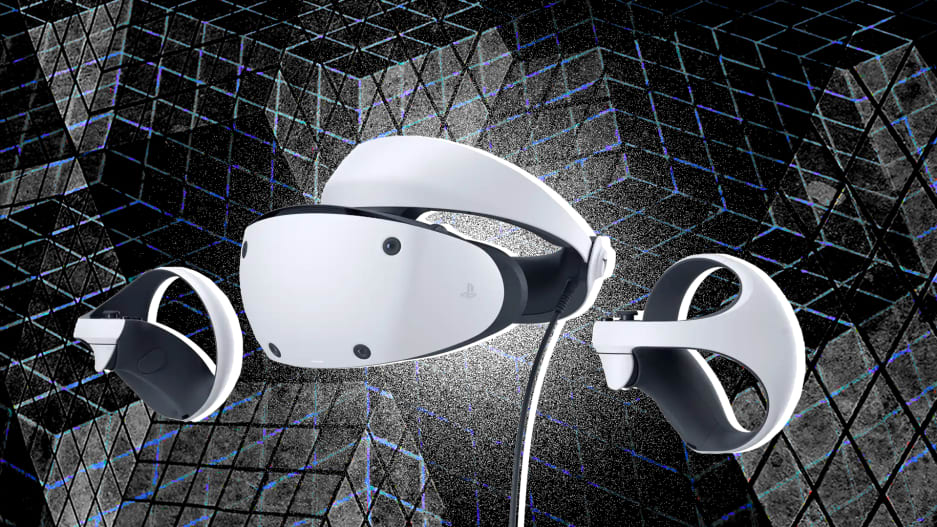- | 10:15 am
The war for the metaverse enters a new phase as Sony and Apple join the fray

It would be easy to write off Sony’s unveiling of the PlayStation VR2 headset and controllers on Tuesday as just the latest move in a marketing campaign, meant to slowly build interest in the PS5 peripheral. And in many ways, that’s just what it is. But it’s also a sign that the battle for virtual reality (VR) supremacy is about to heat up once again—and the fate of the metaverse could be at stake.
VR’s not entirely essential to the metaverse, of course. You can visit Decentraland without a headset, for instance. But proponents have pushed VR technology as the best way to interact with others in the virtual world (none more loudly than Mark Zuckerberg, who just happens to own a VR company).
Sony had an advantage when it released the first PlayStation VR in 2016. The system was cheaper than the then-new Oculus Rift, didn’t require a high-end computer, and, while not wireless, was much less cumbersome than other VR headsets at the time. It also launched with game franchises people knew, including Batman: Arkham, Resident Evil and Final Fantasy. That led to sales of more than 5 million units by the end of 2019.
But this time around, the competitive landscape is different. Meta’s Oculus Quest 2 costs a reasonable $299 (vs. the $599 original price tag of the Rift). It’s also a wireless device with a rich catalog of software. And the company has sold more than 10 million Oculus Quest 2 headsets, as Qualcomm CEO Cristiano Amon announced at that company’s 2021 investor day last November. (Qualcomm’s Snapdragon XR2 chipset powers the Quest 2.)
Sony has not provided pricing or a release date for the PlayStation VR 2 so far. But, the field for VR headsets is growing more crowded. HTC’s Vive remains a competitor in the VR space—and its introduction of the $499 Vive Flow, a VR headset with no controller and a sunglasses-like design—could make it a player as the metaverse grows. The real looming threat, though, comes from Apple.
While the Cupertino-based company has not made any formal announcements, it is widely expected to launch its own VR headset in the coming year, possibly this fall, though that could be pushed to 2023.
Apple is reportedly working on two virtual/augmented reality projects: a high-end headset for developers and professionals and “Apple Glasses,” which are targeted at a wider audience. It’s unclear if those will launch simultaneously.
Add it all up and there are several companies jockeying for a leadership position in VR. The long-term play, of course, is the metaverse.
Facebook is spending $10 billion over the next year to shift its focus to the digital world. And while Sony (and perhaps others) will focus initially on the interactive entertainment aspects of the technology, they’re certainly keeping their eye on the long term.
After all, while Facebook is hoping its efforts will become the home of the metaverse, there are plenty of possible competitors, including gaming juggernaut Fortnite, which has steadily been building on top of its origins as a battle royale action game, most recently adding experiences called Party Worlds, player-created spaces that have strict rules prohibiting violence and combat. Examples of these include Walnut World, a virtual amusement park, and Late Night Lounge, an area to make new friends and hang out with older ones. Roblox, similarly, creates virtual spaces for players, including hosting concerts from acts like Twenty One Pilots and Lil Nas X.
Neither Fortnite nor Roblox utilizes VR headsets right now, but it’s easy to picture one or both incorporating support for the technology. And Sony and Apple each have their own ecospheres that could easily be converted to a metaplace gathering spot.
Step one, though, is getting headsets into people’s hands—and on their heads. Just as important is showing them why the metaverse is worth their time.
Both are sizable hurdles. VR has been touted as the technology of the future for nearly 55 years, when Ivan Sutherland (in 1968) created the first VR head-mounted display system, which he dubbed The Sword of Damocles (due to its intimidating appearance). And it was eight years ago that Oculus began to turn heads, only to suffer a number of setbacks that slowed its momentum.
But if the metaverse actually is going to be a critical part of people’s lives in the future, particularly with VR as a significant component, this is the time we’ll look back upon to see where some of the foundation was laid.







































